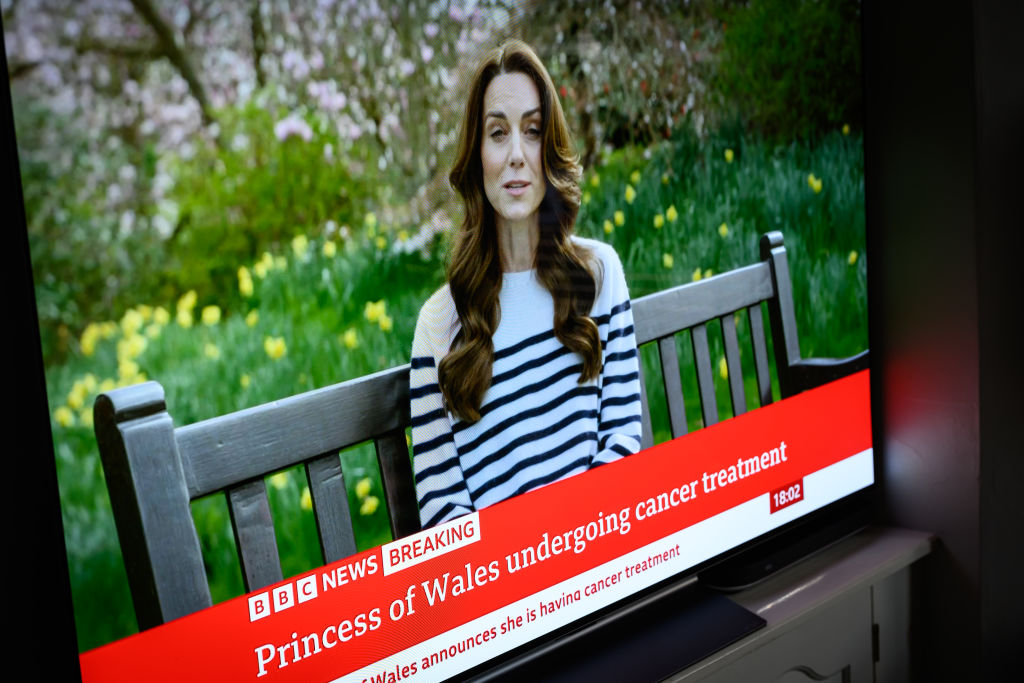The BBC released a statement in response to complaints from people who felt its coverage of Kate Middleton, the Princess of Wales, announcing her cancer diagnosis was “excessive and insensitive,” the British public broadcaster said.
The royal announced in a video released on March 22—which was filmed by BBC Studios—that she had been diagnosed with an undisclosed type of cancer following tests conducted after a planned abdominal surgery in January. After the procedure, Kensington Palace had announced she would be absent from the public eye until at least Easter, but the uncertainty about her health led to a media and public frenzy before her cancer diagnosis announcement.
The BBC’s statement in response to criticism of its coverage, released April 5 on its complaints website, read: “We broadcast in full the highly personal video message from the Princess of Wales, in which she spoke directly to the public about her cancer diagnosis. Our coverage reflected the significance of this story and the outpouring of support for the princess from around the globe. We explained to our audience what was known about Catherine’s condition, but did not speculate on details that had not been made public.”
The broadcaster said its reporting “made clear that this is a difficult time for the princess and the rest of the royal family; we have been mindful at all times to approach our coverage with sensitivity.”
The news organization said that it examined the “intense speculation” about Kate’s health in the weeks preceding her announcement and reported on her request for privacy and the statement from Kensington Palace detailing her right for medical privacy.
“We always give careful consideration to the editorial decisions we make. While we have a responsibility to report on stories that are of interest to our audience, we appreciate that not everyone would have approved of the approach we took,” the BBC concluded.
The BBC produces fortnightly reports of complaints that number more than 100. It also releases public statements in response to coverage that has generated a significant number of complaints or raised notable issues.
The BBC already issued two public statements this year in response to complaints about prior Kate Middleton reporting and coverage of her father-in-law, King Charles III’s cancer diagnosis.

On March 21, the BBC responded to complaints that the public felt its reporting on the withdrawal of an edited photo of the Princess of Wales and her three children, released on social media on U.K.’s Mother’s Day, was “excessive and sensationalist.” Kate took credit for editing the image and apologized after multiple photo agencies pulled it, noting it had been manipulated.
The BBC said the photo generated global interest because it was the first official picture released since Kate’s surgery in January—and ignited even more interest after it was withdrawn.
“Our coverage examined why this had caused so much interest and looked at considerations raised over the royal family’s communication strategy and public trust in information given by the Palace,” the BBC’s statement read. “We heard a nuanced and broad range of perspectives, including from those who were sympathetic to the princess, and those who felt this wasn’t an issue, given it isn’t unusual for people to edit their family photos before sharing them. Once the princess had issued her own statement on the matter, this was featured throughout our reporting.”
On Feb. 9, the BBC responded to complaints that it had “given too much coverage to the King’s cancer diagnosis.” The broadcaster said the news was “a story of significance which has generated national and global interest,” one that posted challenges for the royal family and was revealed in a statement containing an “unprecedented” level of detail about the health of a British monarch. The BBC said Buckingham Palace explained the King wanted to raise awareness about cancer, and the broadcaster subsequently has reported on cancer charities and the disease.
The BBC has previously received complaints and issued responses regarding its royals’ coverage, particularly on major events.
In 2021, the broadcaster received nearly 110,000 complaints for excessive coverage of the death of Prince Philip, the late Queen Elizabeth II’s husband. In 2022, the news organization responded to complaints that its coverage of Queen Elizabeth’s death was “biased” toward the monarchy.
More Must-Reads from TIME
- Cybersecurity Experts Are Sounding the Alarm on DOGE
- Meet the 2025 Women of the Year
- The Harsh Truth About Disability Inclusion
- Why Do More Young Adults Have Cancer?
- Colman Domingo Leads With Radical Love
- How to Get Better at Doing Things Alone
- Michelle Zauner Stares Down the Darkness
Contact us at letters@time.com